

China's frustrated youth. China's youth is experiencing growing frustrations.
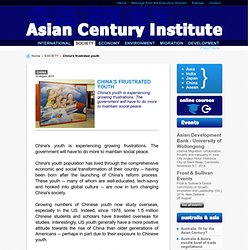
The government will have to do more to maintain social peace. China's youth population has lived through the comprehensive economic and social transformation of their country -- having been born after the launching of China's reform process. These youth -- many of whom are well-educated, tech-savvy and hooked into global culture -- are now in turn changing China's society. Growing numbers of Chinese youth now study overseas, especially in the US. Indeed, since 1978, some 1.5 million Chinese students and scholars have travelled overseas for studies. 2012.04.26.wp358.dev.asia.pension.systems. Asian Century Institute - Restructuring Economies, Transforming Societies.
Sustainable wellbeing requires not just economic restructuring but also social transformation, argued Dennis Snower in his opening address to this year's Global Economic Symposium.
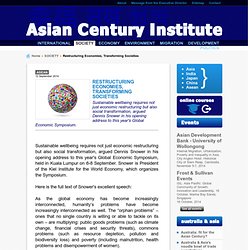
Sustainable wellbeing requires not just economic restructuring but also social transformation, argued Dennis Snower in his opening address to this year's Global Economic Symposium, held in Kuala Lumpur on 6-8 September. Snower is President of the Kiel Institute for the World Economy, which organizes the Symposium. Here is the full text of Snower's excellent speech: As the global economy has become increasingly interconnected, humanity’s problems have become increasingly interconnected as well. Many, including myself, believe that these myriad problems are merely symptoms of a profounder underlying cause, namely, that the world is undergoing a Great Transformation. A suitable metaphor, as we shall see, for interlocking economic and social relations is a tree. Social Pensions Key to Protecting Elderly, Reducing Poverty. Asia is a terrible model for elderly care, Jeremy Hunt. Jeremy Hunt is now pointing to Asian culture as exemplary in caring for the elderly, saying he is struck by the "reverence and respect" for older people in Asian cultures as the health secretary.

I have lived in South Korea for five years, and I wish I could say I have been struck by the same things. Instead, I've been struck by frightening poverty among older people whose living conditions are miserable. It's a sad irony that for all the supposed emphasis on respecting elders in Confucian societies, so many of them across Asia live in a state barely better than completely neglected. Take South Korea, for example. Certainly many older people live in clean and comfortable surroundings with their children, but far too many are shunted aside, on their own in cramped, run-down apartments or worse, badly run nursing homes. People in Britain had better start asking the same question if the government wants to follow Asia's lead.
Elderly suicides in South Korea: Poor spirits. THEIR son-in-law’s visit was a customary show of filial piety for late November.
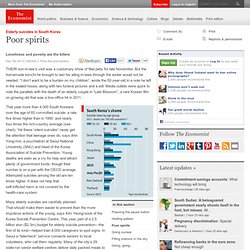
But the homemade kimchi he brought to last his ailing in-laws through the winter would not be needed. “I don’t want to be a burden on my children”, wrote the 82-year-old in a note he left in the sealed house, along with two funeral pictures and a will. Media outlets were quick to note the parallels with the death of an elderly couple in “Late Blossom”, a rare Korean film on growing old that was a box-office hit in 2011. That year more than 4,000 South Koreans over the age of 65 committed suicide: a rate five times higher than in 1990, and nearly four times the rich-country average (see chart). Yet these “silent suicides” rarely get the attention that teenage ones do, says Ahn Yong-min, a psychiatrist at Seoul National University (SNU) and head of the Korea Association of Suicide Prevention. Population Pyramid of ASIA in 2030. Aging in Asia. Risk of Population Aging in Asia. Volume 120, 19 March 2014, Pages 36–45 3rd International Geography Symposium, GEOMED2013, 10-13 June 2013, Antalya, Turkey.
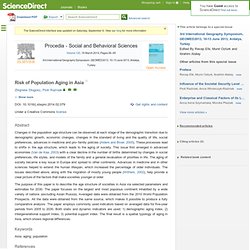
Risk of Population Aging in Asia. Asian Century Institute - Japan's demographic drama. Japan is undergoing a dramatic demographic transition, with a rapid aging and prospective decline of its population.
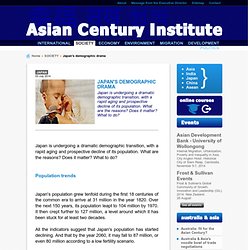
What are the reasons? Does it matter? What to do? Population trends Japan's population grew tenfold during the first 18 centuries of the common era to arrive at 31 million in the year 1820. All the indicators suggest that Japan's population has started declining. Japan's population is also "aging" dramatically, meaning that the share of old persons in the population is growing. The share of youth, below the age of 15, has also fallen from 15.9% in 1995 to 12.8% in 2013, and could fall further to 9.9% in 2060. Asian Century Institute - Chinese dream means learning to manage change. Chinese dream will become reality only if China learns to manage change, argues G.
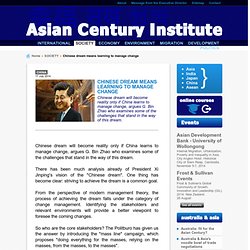
Bin Zhao who examines some of the challenges that stand in the way of this dream. There has been much analysis already of President Xi Jinping's vision of the "Chinese dream". One thing has become clear: striving to achieve the dream is a common goal. From the perspective of modern management theory, the process of achieving the dream falls under the category of change management. Identifying the stakeholders and relevant environments will provide a better viewpoint to foresee the coming changes. Asian Century Institute - Asia's looming demographic dilemmas. Asia's rapidly emerging economies have benefited from a "demographic dividend".
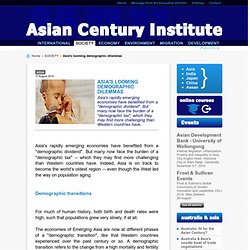
But many now face the burden of a "demographic tax", which they may find more challenging than Western countries have. Asia's rapidly emerging economies have benefited from a "demographic dividend". But many now face the burden of a "demographic tax" -- which they may find more challenging than Western countries have.
Indeed, Asia is on track to become the world's oldest region -- even though the West led the way on population aging. Demographic transitions For much of human history, both birth and death rates were high, such that populations grew very slowly, if at all. The economies of Emerging Asia are now at different phases of a "demographic transition", like that Western countries experienced over the past century or so.